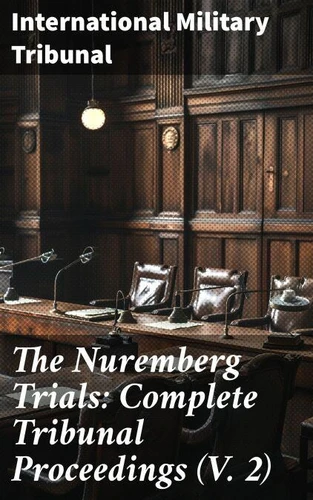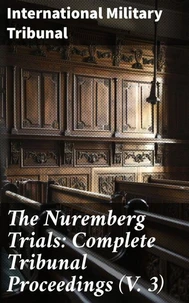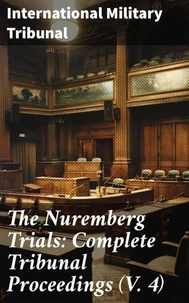The Nuremberg Trials: Complete Tribunal Proceedings (V. 2). Trial Proceedings From Preliminary Hearing Held on 14 November 1945 to 30 November 1945
Par :Formats :
Disponible dans votre compte client Decitre ou Furet du Nord dès validation de votre commande. Le format ePub est :
- Compatible avec une lecture sur My Vivlio (smartphone, tablette, ordinateur)
- Compatible avec une lecture sur liseuses Vivlio
- Pour les liseuses autres que Vivlio, vous devez utiliser le logiciel Adobe Digital Edition. Non compatible avec la lecture sur les liseuses Kindle, Remarkable et Sony
 , qui est-ce ?
, qui est-ce ?Notre partenaire de plateforme de lecture numérique où vous retrouverez l'ensemble de vos ebooks gratuitement
Pour en savoir plus sur nos ebooks, consultez notre aide en ligne ici
- Nombre de pages455
- FormatePub
- ISBN859-65--4777887-5
- EAN8596547778875
- Date de parution15/12/2023
- Protection num.Digital Watermarking
- Taille959 Ko
- Infos supplémentairesepub
- ÉditeurGOOD PRESS
Résumé
The Nuremberg Trials: Complete Tribunal Proceedings (V. 2) offers a meticulously detailed account of the landmark legal proceedings that sought justice for the atrocities committed during World War II. This volume presents not just verbatim transcripts of the trials but also the profound moral and legal dilemmas faced by both the prosecution and defense. The text is rendered in a formal, legalistic style, reflective of its historical context'Äîa time when the world grappled with the implications of humanity's darkest hour and sought to establish a framework for international law and human rights.
The inclusion of testimonies and cross-examinations brings to life the gravity of the proceedings, emphasizing the trials' significance in shaping modern jurisprudence. The International Military Tribunal, composed of judges from the Allied powers, was established in the aftermath of the war to hold key Nazi officials accountable. Their commitment to preserving the record of these unprecedented proceedings arose from a shared belief in the necessity of judicial accountability, a sentiment that resonated through the tribunal'Äôs methods and objectives.
Notably, this work reflects the complexities of moral judgment in a post-war world, illustrating the delicate balance between justice and mercy. This essential volume is recommended for scholars, legal professionals, and history enthusiasts alike. It serves not only as a primary source for understanding the trials but also as a foundation for discussions on justice, reconciliation, and the ongoing struggle against impunity.
Readers will find themselves immersed in the difficult legal and ethical questions that continue to shape international law today.
The inclusion of testimonies and cross-examinations brings to life the gravity of the proceedings, emphasizing the trials' significance in shaping modern jurisprudence. The International Military Tribunal, composed of judges from the Allied powers, was established in the aftermath of the war to hold key Nazi officials accountable. Their commitment to preserving the record of these unprecedented proceedings arose from a shared belief in the necessity of judicial accountability, a sentiment that resonated through the tribunal'Äôs methods and objectives.
Notably, this work reflects the complexities of moral judgment in a post-war world, illustrating the delicate balance between justice and mercy. This essential volume is recommended for scholars, legal professionals, and history enthusiasts alike. It serves not only as a primary source for understanding the trials but also as a foundation for discussions on justice, reconciliation, and the ongoing struggle against impunity.
Readers will find themselves immersed in the difficult legal and ethical questions that continue to shape international law today.
The Nuremberg Trials: Complete Tribunal Proceedings (V. 2) offers a meticulously detailed account of the landmark legal proceedings that sought justice for the atrocities committed during World War II. This volume presents not just verbatim transcripts of the trials but also the profound moral and legal dilemmas faced by both the prosecution and defense. The text is rendered in a formal, legalistic style, reflective of its historical context'Äîa time when the world grappled with the implications of humanity's darkest hour and sought to establish a framework for international law and human rights.
The inclusion of testimonies and cross-examinations brings to life the gravity of the proceedings, emphasizing the trials' significance in shaping modern jurisprudence. The International Military Tribunal, composed of judges from the Allied powers, was established in the aftermath of the war to hold key Nazi officials accountable. Their commitment to preserving the record of these unprecedented proceedings arose from a shared belief in the necessity of judicial accountability, a sentiment that resonated through the tribunal'Äôs methods and objectives.
Notably, this work reflects the complexities of moral judgment in a post-war world, illustrating the delicate balance between justice and mercy. This essential volume is recommended for scholars, legal professionals, and history enthusiasts alike. It serves not only as a primary source for understanding the trials but also as a foundation for discussions on justice, reconciliation, and the ongoing struggle against impunity.
Readers will find themselves immersed in the difficult legal and ethical questions that continue to shape international law today.
The inclusion of testimonies and cross-examinations brings to life the gravity of the proceedings, emphasizing the trials' significance in shaping modern jurisprudence. The International Military Tribunal, composed of judges from the Allied powers, was established in the aftermath of the war to hold key Nazi officials accountable. Their commitment to preserving the record of these unprecedented proceedings arose from a shared belief in the necessity of judicial accountability, a sentiment that resonated through the tribunal'Äôs methods and objectives.
Notably, this work reflects the complexities of moral judgment in a post-war world, illustrating the delicate balance between justice and mercy. This essential volume is recommended for scholars, legal professionals, and history enthusiasts alike. It serves not only as a primary source for understanding the trials but also as a foundation for discussions on justice, reconciliation, and the ongoing struggle against impunity.
Readers will find themselves immersed in the difficult legal and ethical questions that continue to shape international law today.






